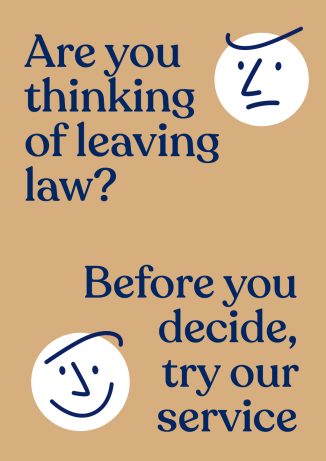Warm-up
‘Competition’ is defined as “the activity or condition of striving to gain or win something by defeating or establishing superiority over others”. Similarly, ‘Competitiveness’ is defined as a “strong desire to be more successful than others”. Establishing superiority over others. More successful than others. By these definitions, competition and competitiveness involve a comparison, a judgement, some kind of analysis or scrutiny of ourselves as against other people. This can be an incredibly self-destructive habit amongst an already very demanding and high-pressure working environment. And it’s one that will hold you back from achieving your best in the law.
Synonyms for the word ‘competition’ include the following – struggle, conflict, battle, combat, dogfight, strife, confrontation, forcefulness, combativeness, and aggression.
Sustainable and enjoyable working relationships are built upon integrity, effective communication, camaraderie, and mutual support. None of the synonyms above describe the foundations of harmonious working relationships with your colleagues, do they?
Hill sprints on the corporate ladder
We are a society of wanting more, more and then even more. Law firm culture thrives on competition and competitiveness between their employees. Who is bringing in the most work? Who is working on the most complex matters? Briefing the most senior of Counsel? Billing the most? Working the longest hours? Earning the most? Next to be promoted? Being nominated for the most awards?
While competition in the workplace can bring about benefits such as increased motivation, higher performance and fostering personal development, competition can also create an internal narrative within us that depletes our self-esteem and self-worth, and drives fear and judgement. It can cultivate an environment of more pressure, more stress, more anxiety. And lots of resentment.
We know that the legal profession is hierarchical. There’s the progression from Lawyer, to Associate, to Senior Associate, to Special Counsel, to Partner. From a mid-tier, to a top-tier. From Junior Counsel to Senior Counsel. We’ve been taught, and arguably even encouraged, to define our worth by our title. While a change in title typically comes with more money, greater status or prestige, and is one (yes, one) way to measure your growth and achievements in the profession, it’s still, at the end of the day, just a title. Social media posts on LinkedIn where people announce their promotions is a way for us to celebrate our peers, but it’s also an insidious way for us to compare ourselves to others in an unhelpful way – a way that perhaps results in us feeling inferior, unworthy or anxious about not doing or being ‘enough’. Whatever ‘enough’ is.
Finding your own stride
Competing with others and comparing ourselves to others strips us of our authenticity. Our true value is simply just in being ourselves. The kind of comparison that makes us feel really bad about who we are is not a productive use of time or energy. While a colleague’s drafting style, or their ability to build rapport with clients, or negotiate robustly might all be things you admire, and want to learn from, the comparison that your colleague is ‘better’ than you, and that you are therefore ‘worse’, is a narrative to start moving away from. We want to learn from, grow from, and be motivated and inspired by others. We want to avoid the rabbit hole of analysing, critiquing and judging ourselves as against the accomplishments and attributes of another.
To be constructive, competition has to be practiced constructively. And the way to do that is to compete with yourself, and not with others. Stay in your own lane. Run your own race. When competition is practiced this way, freudenfreude is possible. It’s the German word to describe feeling genuine joy for another person’s success. Studies have shown how integral freudenfreude is to our mental health and maintaining strong interpersonal relationships. Honestly ask yourself how often you feel genuine joy for another person’s success. Particularly when it’s something you want, and something you value.
Comparison is normal. It’s a part of being human. This isn’t preaching that you shouldn’t compare, or if you do, you’re doing something wrong or bad. We’re trying to develop a level of understanding about how useful your current thinking patterns are, and to encourage a greater sense of self-awareness about what is going on for you. The key is to tap into that comparison narrative and derive something constructive from it. When you find yourself comparing, or competing, ask yourself questions like these:
- What exactly am I feeling right now? Am I feeling insecure, unworthy, jealous, envious, judgemental, fearful or resentful? Name the feelings that come up for you.
- Why am I comparing myself to someone else? Is it productive? Useful? Helpful? Motivating? Inspiring? Or is it making me feel inadequate, inferior, unworthy or all three?
- What has triggered the feelings? Is it because the other person is favoured by a Partner, or the clients, or members of the Bar, is popular amongst others in the firm, or is working on more complex matters?
- Why am I feeling the way I do? Why does it bother me so much? Do I want some or all of those things my colleague has, or the things I think they have?
- What action can I put in to change the way I feel? Can I shift my perspective or mindset to show kindness to myself? That empowers me?
- Who can I talk to about how I feel?
We learn that jealousy is a ‘bad’ emotion and something for us to feel shame about. The next time you acknowledge you’re feeling that pang of jealousy towards a colleague, tap into why. It’s probably an indication of something you want, or something that’s important to you. Now, instead of consuming your thoughts with what someone else is doing, shift your perspective inwards and focus on the action you can put in to work towards that goal.
Keeping your own pace
Theodore Roosevelt called comparison the “thief of joy”. And there is such merit in that short phrase. Working in a way that plays to your strengths, and aligns with your values is going to give you the best chance of achieving success in your working life, whatever success looks like to you.
What are your strengths? Write them down. Refer back to them regularly. This might actually be quite a challenging exercise. We are often not that great at identifying what we’re good at. And when we’ve had a hard day, a hard week, or a hard month, they’re often the things we forget about first. What have you achieved this year that you didn’t think you could, or would? Write them down, too.
Learning to accept ourselves is a process that doesn’t just transpire by just thinking about it. Coming to a place of self-acceptance requires practice. Becoming aware of our triggers doesn’t necessarily make them go away, either. Change requires action. And remember, this is more akin to a marathon, not a sprint.




